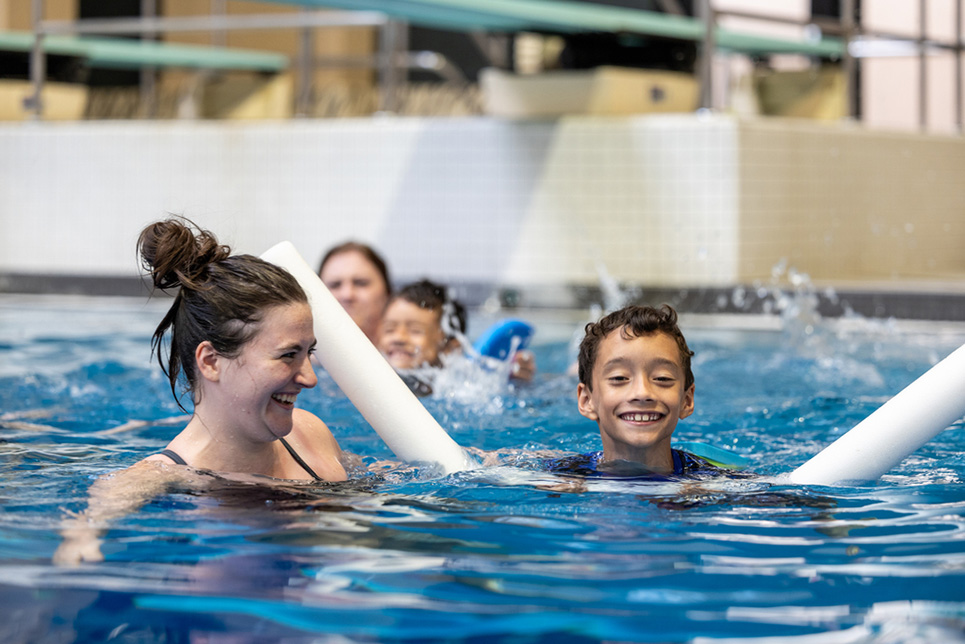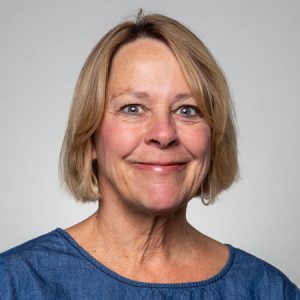March 12, 2024
Story by Ryan Gauthier

Whether in a classroom or a clinical setting, students with the Mizzou Department of Occupational Therapy or pursuing other health sciences fields are making a difference in the lives of families in Missouri and beyond.
That impact becomes crystal clear in the pools of the Mizzou Aquatic Center, where OT students volunteer their time to teach adapted swimming lessons for children with autism or similar conditions.
The Swimming and Water Instruction Modifications (S.W.I.M.) program started in 2017 after two OT students expressed interest in helping local kids who otherwise might not be able to take more traditional lessons.
The students worked with Lea Ann Lowery, a clinical professor in the OT department and Brittney Stevenson, a clinical associate professor, to bring that vision to life.
Lowery said demand for the program has been high since its inception. She noted many kids slip between the cracks and are never taught how to swim and be safe around the water due to significant shortages of recreation facilities that support adaptive swim instruction.
“After COVID, I think a lot of pools struggled to find enough people to teach swimming,” Lowery said. “Adding another layer of swimmers who have more complex needs is probably just too challenging.”
But pool and water safety are absolutely vital for people with autism or similar conditions. The American Red Cross reports drowning is the leading cause of death for young children, and children with autism spectrum disorder are 160 times more likely to drown than their peers.
“It’s a sad stat,” Lowery said. “One of the hard things is that there just aren’t many recreation providers who feel like they have the skill sets to teach kids with autism how to swim. But it’s not rocket science — teaching kids with any disability simply requires you to be a little more creative.”
Stroke of genius

Communication is often the biggest challenge when working with children with autism, as Lowery says kids might be minimally verbal or struggle to understand instructions. Anxiety can also be a challenge for autistic kids, which can lead to behavioral challenges in unfamiliar environments.
But overcoming these hurdles is easier than it might seem. Lowery said many S.W.I.M. participants learn well with visual aids, such as images or even videos of people demonstrating desired actions. Others respond well to approaches that use toys and games of interest as well as other sources of motivation.
“A lot of our kids love the hot tub,” Lowery said. “So we’ll ask them to kick 10 times in the water or jump into the pool, and then they’re able to get some time in the hot tub as a reward for that behavior.”
The sessions — held at the MizzouRec in the spring, summer and fall — focus on basic swim instruction like blowing bubbles in the water, scooping arms and kicking feet, learning to back float and entering and exiting the pool safely. But instructors also provide information about drowning and wandering prevention to the families of participants.
“We don’t want to scare any parent, but we also want to address the safety issues and make sure that families are equipped and knowledgeable about how to keep their kids safer around water,” Lowery said.
The classes are in such high demand that it maintains a waitlist of 75-100 kids from various Missouri counties, she said. Representatives with the S.W.I.M. program have offered training to area providers and YMCAs both nearby in Jefferson City and farther out in Illinois and other communities. The hope is to help more providers feel more comfortable teaching swimming lessons to kids with autism to serve that population better.
The S.W.I.M. program has been a tremendous asset to the community while also allowing students and members of the OT department to give back.
“We clinicians do a lot of good things,” Lowery said. “But if we’re only doing it in hospital rooms and outpatient clinics, then we aren’t really impacting the everyday world where people live. I firmly believe that we need to be taking our skill sets and knowledge and helping our communities be stronger and better.”
